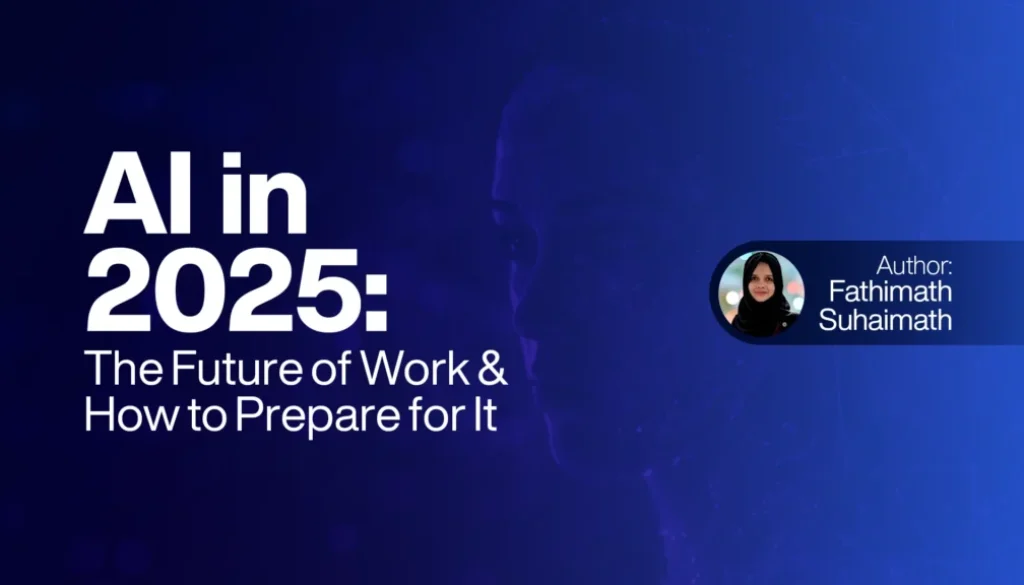AI in 2025: The Future of Work and How to Prepare for It
AI is changing how we live and work, and by 2025, it will have a bigger impact in the workplace. It will automate tasks and help drive innovation, but also bring challenges like job loss, ethical concerns, and the need to keep learning new skills. This blog will look at how AI will affect jobs, industries, and what we can do to prepare for the future of work.
Table of Contents
1. Automation of Routine Tasks: Streamlining Operations
By 2025, AI will take over tasks like data entry, admin work, and customer service. In industries like finance, healthcare, and retail, AI will handle data processing, inventory management, and customer support. AI assistants will also manage calendars, answer questions, and do research, saving time.
Preparation:
As automation grows, workers will shift to more creative and decision-making roles, leaving repetitive tasks to AI. Instead of fearing AI, it’s important to embrace it, as it helps boost productivity. Upskilling and learning new skills will be key to moving into jobs that need human judgment and creativity.
2. AI-Augmented Decision Making: Enhancing Business Intelligence
By 2025, AI will help make decisions in many industries. It will analyze data to provide insights in areas like marketing, finance, and HR. For example, AI can predict market trends or customer preferences, helping businesses make better decisions.
Preparation:
To succeed in an AI world, employees need to understand data and AI insights. They should spot biases in data and use it in real situations. It’s also important to work with AI while making decisions based on human judgment and ethics.
3. The Emergence of Hybrid Roles: Humans and AI Working Together
AI won’t replace jobs entirely; it will create roles where humans and AI work together. In healthcare, AI helps analyze data, but doctors still make decisions and provide care. In finance, AI analyzes data, while advisors give personalized advice. Together, they solve complex problems.
Preparation:
To succeed in hybrid roles, workers need both technical skills, like understanding AI, and soft skills, like communication and critical thinking. Learning about AI’s strengths and limits will help workers use it to improve their work.
4. AI and Remote Work: Facilitating the Digital Workplace
The global shift toward remote work, accelerated by the pandemic, will continue into 2025, with AI playing a significant role in enhancing productivity, collaboration, and communication in digital workspaces. AI-powered project management toosignificantlyls will streamline workflows, while intelligent assistants will help employees manage schedules, meetings, and tasks.
Preparation:
As remote work increases, employees will need to use AI tools for communication, task management, and collaboration. Being flexible and ready to learn new tools will be important for working effectively from home.
5. Ethical Considerations: Balancing Innovation with Responsibility
AI in the workplace will bring up ethical issues like fairness, privacy, and transparency. For example, AI hiring tools might be biased, and surveillance tools could invade privacy. Organizations must create rules to ensure AI is used fairly, responsibly, and transparently.
Preparation:
Organizations need to set ethical guidelines to use AI responsibly. Employees should learn about the ethical impacts of AI and be trained to handle challenges. It’s important for workers to understand transparency and fairness, especially in areas like hiring, promotions, and performance reviews.
6. Reskilling and Lifelong Learning: Preparing for the AI-Driven Future
As AI continues to evolve, so too will the skills required to succeed in the workplace. Many of the jobs that exist today will evolve, and new roles will emerge. The future of work will require employees to continually learn and adapt to new technologies. Reskilling programs will become more important than ever, enabling workers to stay competitive and relevant. AI-powered learning platforms will offer personalized training tailored to individual needs, helping workers acquire new skills on demand.
Preparation:
To succeed in an AI world, keep learning. Use AI education tools, take courses in tech like data science, and stay updated on new skills. Being flexible and adaptable will help you thrive in the changing job market.
7. The Future of Jobs: Job Displacement and New Opportunities
AI will replace some jobs but create new ones. Jobs needing creativity, emotional intelligence, and problem-solving will still be needed. Fields like AI development, machine learning, and robotics will grow, along with roles in AI ethics and governance.
Preparation:
Workers in at-risk jobs should learn skills in areas like AI, robotics, or cybersecurity. Being open to new career paths is important as the job market changes. Companies should encourage innovation and help employees move to new roles as AI changes industries.
Conclusion:
The future of work in 2025 will be shaped by AI technologies. As automation and AI-driven decision-making become more common, employees and organizations need to adapt. Workers should focus on lifelong learning and gaining new skills to work alongside AI, while companies must promote innovation and ethical practices. Success in this AI-powered world means embracing AI, using it as a tool, and preparing for the opportunities and challenges it brings, rather than fearing it. By doing so, both individuals and organizations can thrive in the future of work.



